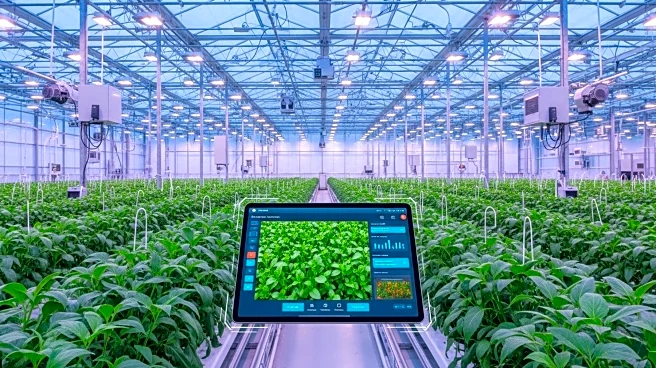What's Happening?
The agriculture industry is increasingly turning to advanced digital technologies to address the challenges of rising global food demand, complex supply chains, and climate volatility. Farmers are now utilizing soil and weather sensors, remote sensing, UAV drones, and artificial intelligence to optimize irrigation, fertilization, and crop monitoring. These technologies provide real-time data and insights, allowing farmers to make informed decisions that enhance crop yields and resource efficiency. The integration of digital tools with traditional agronomic expertise is proving essential in navigating the complexities of modern farming, as demonstrated by significant improvements in water use and crop yields in various agricultural sectors.
Why It's Important?
The adoption of digital technologies in agriculture is crucial for addressing the increasing demands on food production and the challenges posed by climate change. By leveraging data-driven insights, farmers can improve resource management, reduce waste, and increase productivity, which is vital for ensuring food security. The integration of technology with human expertise allows for more sustainable farming practices, meeting the growing consumer and regulatory demands for environmentally friendly agriculture. This shift not only benefits farmers by enhancing profitability and efficiency but also contributes to broader societal goals of sustainability and climate resilience.
What's Next?
As the digital revolution in agriculture continues, the focus will likely be on further integrating these technologies into existing farming systems to maximize their impact. Future developments may include more sophisticated AI-driven tools and cloud-based platforms that centralize data for easier access and decision-making. The industry may also see increased collaboration between technology providers and agricultural experts to develop solutions that are both innovative and practical. As these technologies become more accessible, they have the potential to transform farming practices globally, making agriculture more resilient to climate change and market fluctuations.
Beyond the Headlines
The move towards digital agriculture raises important considerations about the balance between technology and traditional farming knowledge. While digital tools offer significant advantages, they cannot replace the nuanced understanding that experienced farmers bring to the table. Ensuring that technology complements rather than replaces human expertise will be key to successful implementation. Additionally, the ethical implications of data privacy and the digital divide in rural areas must be addressed to ensure equitable access to these advancements.








